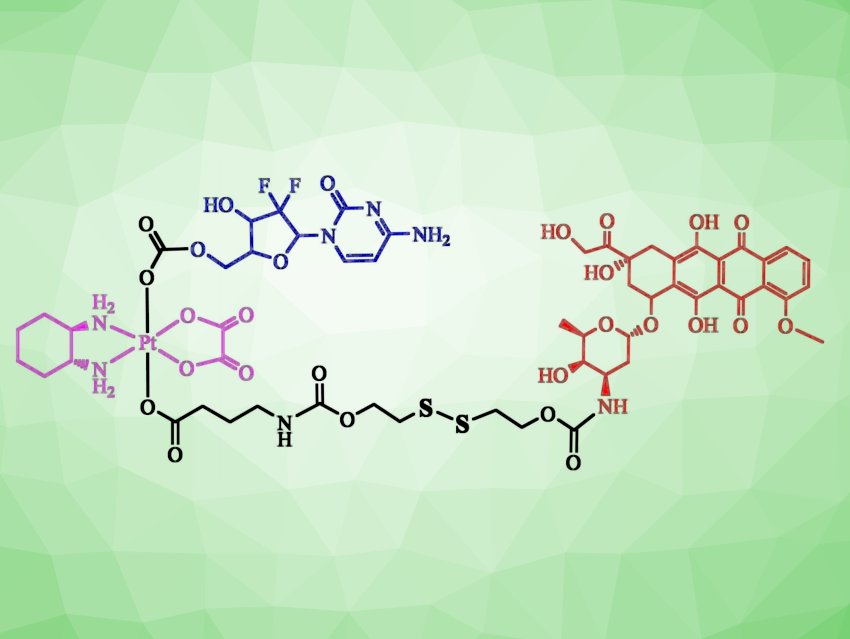To give cancer treatments the greatest possible chance of success, patients are often treated with multiple drugs that attack the cancer using different mechanisms. Valentina Gandin, University of Padova, Italy, Viktor Brabec, Czech Academy of Sciences, Institute of Biophysics, Brno, Czech Republic, Dan Gibson, The Hebrew University of Jerusalem, Israel, and colleagues have combined three highly potent drugs in a single multitargeting prodrug that is activated in the tumor cells. This prodrug (pictured) is more effective and causes fewer side effects in mice than the drugs alone or in a mixture.
Three Drugs At Once
Modern cancer treatments take a number of different routes to fight cancer, often employing a cocktail of drugs to improve the chances of success. However, the human body is not well-suited to receiving so many drugs at once, and unpleasant, even life-altering side effects can occur with cancer treatment. To reduce the burden on patients’ bodies, the team joined three cancer drugs in a single prodrug. “When combined in a single prodrug, there is only one pharmacokinetic behavior and a different toxicity profile,” Gibson says.
The three drugs chosen by the team, gemcitabine (pictured in blue), oxaliplatin (pictured in purple), and doxorubicin (pictured in red), are all proven cancer drugs. The drugs work by damaging cancer cells’ DNA using different mechanisms, preventing the cells from reproducing and stimulating the patient’s own immune response to attack the cancer cells.
“Self-Destructing” Linkers
Two self-immolative linker types were used to link the platinum-containing oxaliplatin to the other organic prodrugs—self-immolative means that the linkers will self-destruct under the right conditions. Oxaliplatin and gemcitabine were conjugated via a carbonate unit, and the doxorubicin was connected via disulfide linkers.
The selected linker types of the multitargeting prodrug can be broken down to activate the drugs by the reducing environment found in tumor cells. The team investigated the reduction of the prodrug in vitro using ascorbic acid, dithioerythritol (DTT), and glutathione (GSH) as reductants and observed the release of the different drugs using high-performance liquid chromatography (HPLC).
Superior Tumor Growth Inhibition and Reduced Side Effects
The team combined oxaliplatin and doxorubicin because they both induce immunogenic cell death (ICD). Interestingly, the addition of gemcitabine, which is not considered an ICD inducer, increased the potency and in vivo activity of the prodrug.
In cell cultures and animal models, the team’s combination drug proved considerably more effective than the drugs on their own or in a 1:1:1 mixture. Side effects were also reduced, with increased selectivity for cancer cells, meaning fewer healthy cells were damaged.
According to the researchers, the design of the linkers in the prodrug was particularly important for these properties: “The impressive biological activity can be attributed to the proper design of the self-immolating linkers connecting the three drugs that facilitate the release of the drugs in their active form, thereby exploiting the best properties of the individual drugs.”
- Multitargeting Prodrugs that Release Oxaliplatin, Doxorubicin and Gemcitabine are Potent Inhibitors of Tumor Growth and Effective Inducers of Immunogenic Cell Death,
Amrita Sarkar, Vojtech Novohradsky, Moumita Maji, Tomer Babu, Lenka Markova, Hana Kostrhunova, Jana Kasparkova, Valentina Gandin, Viktor Brabec, Dan Gibson,
Angew. Chem. Int. Ed. 2023.
https://doi.org/10.1002/anie.202310774




